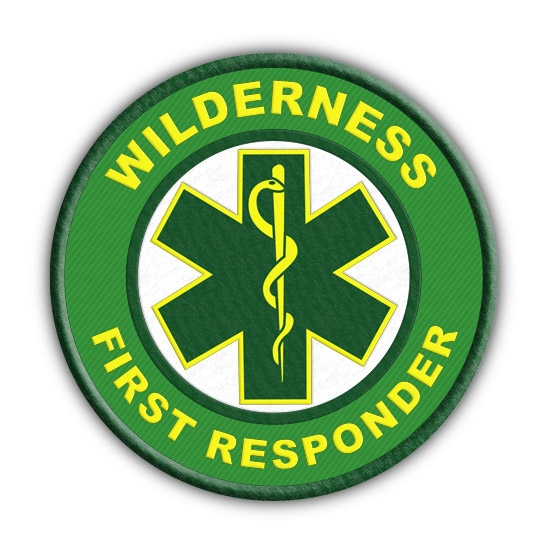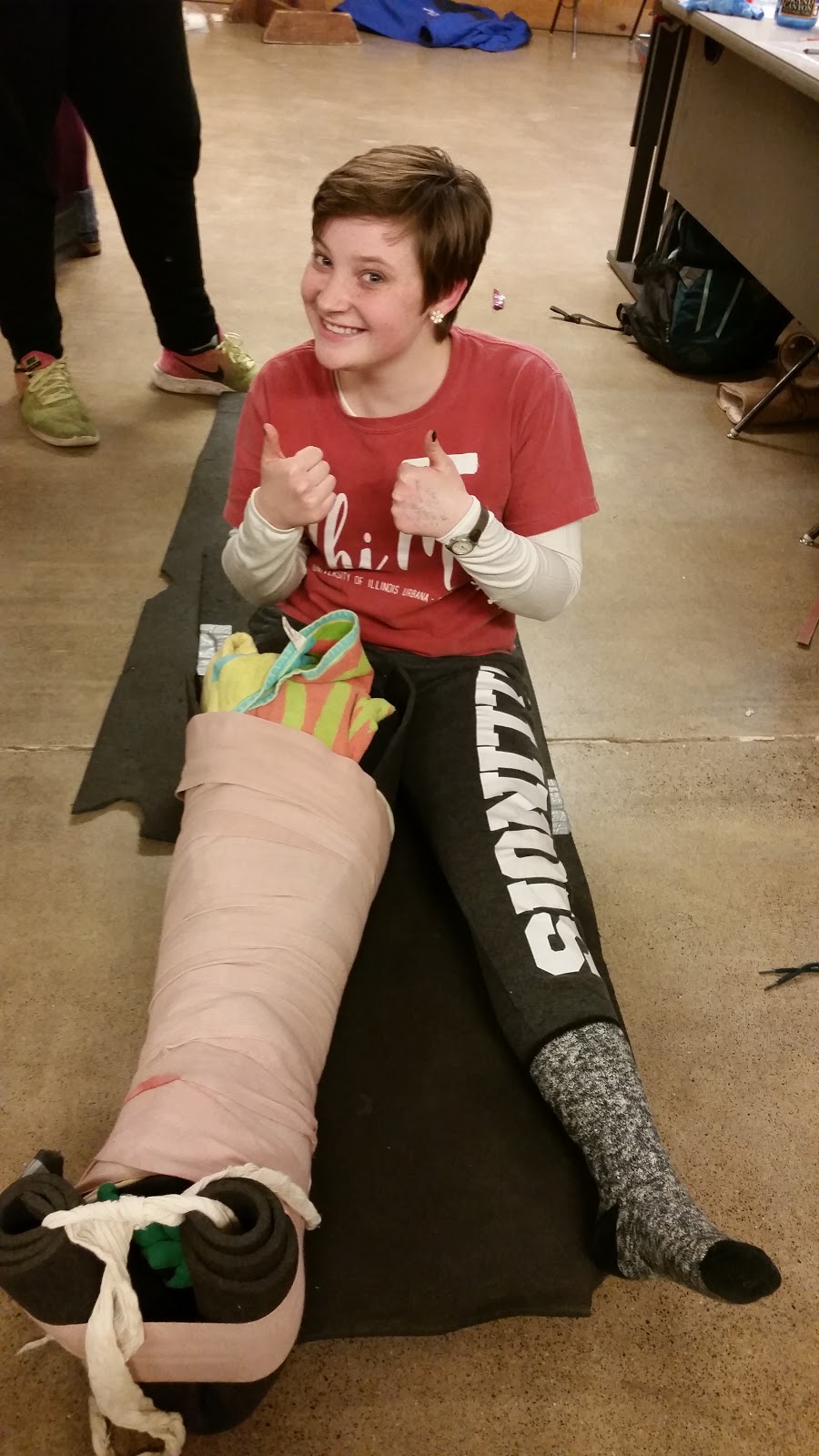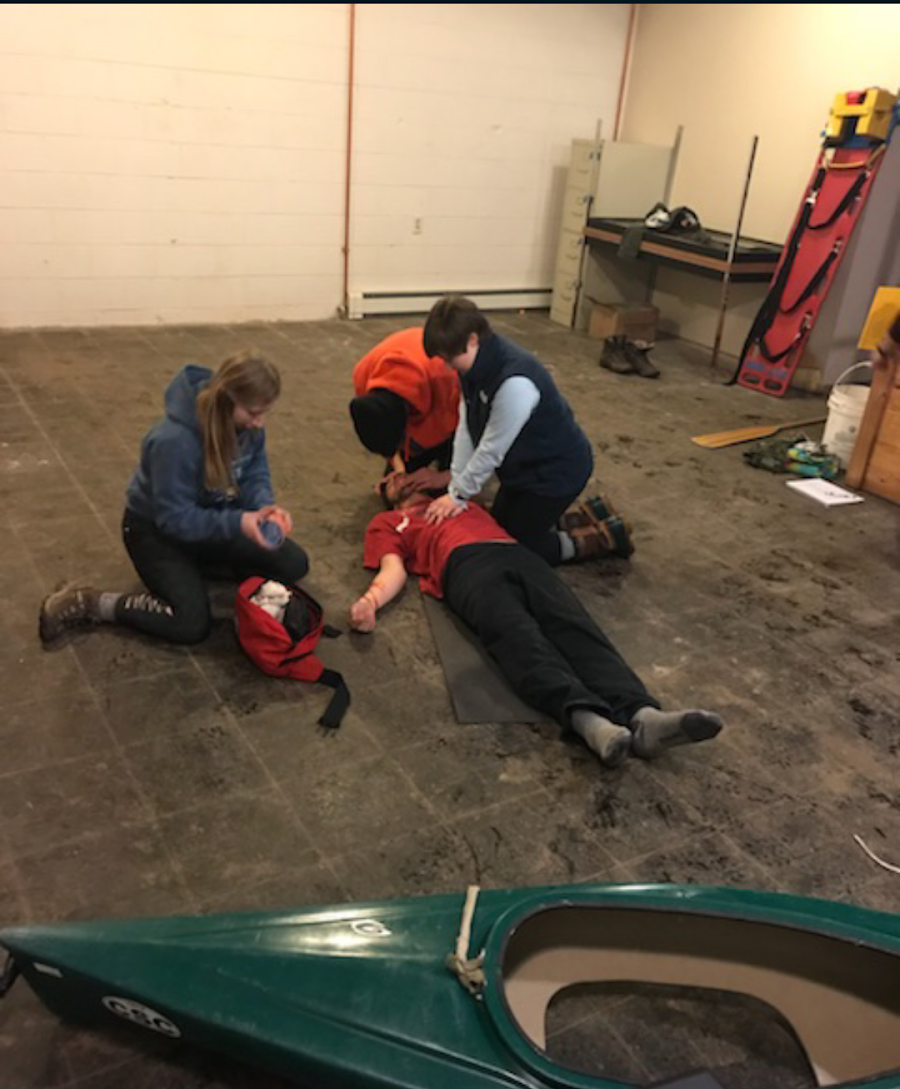Camps Blog: Marjie’s Wilderness First Responder
This blog post is written by Marjie Cone, who will be back for her third year as a camps staff member this summer.

My name is Marjie cone, and I just became a WFR! Now, when I say that people hear “woofer” and ask me if I train dogs or something like that. No, no dogs here. I took a Wilderness First Responder course (hence WFR), and I now have basic medical training for remote outdoor settings. This is definitely not how I expected to spend my last 10 days of winter break, but boy am I glad I did. I guess most people like to take this course in amazing places like Colorado or Australia, but being from Illinois I had to settle for the upper midwest, which is fine because I couldn’t imagine learning about real “wilderness” anywhere other than good ol’ Hudson Wisconsin. I showed up at YMCA Camp St. Croix in what seemed like the middle of nowhere.
The first day they warned us that this class would speed up and take us for a ride. After an entire day of doing just basic first aid it was hard to believe it would get much harder, but oh did they deliver! It started gradual and got faster and faster as we had to splint broken clavicles, tibias, and arms. Then it moved to recognizing the signs of collapsing lungs (a pneumothorax). After that there was heat related illness, cardiac emergencies, and altitude sickness. And in between all of those frightening things, trauma in the wilderness.

We began by practicing full body assessments and diagnosing the flu and broken bones, to handling multiple and extensive injuries in a mass casualty setting. I got to be a patient in one of the first “mass casualty scenarios”. You may have seen a picture of my leg on the Camps’ Instagram ( @SternbergCamps) with some pretty convincing bloody makeup and then a massive splint in the form of a sleeping pad, some random clothes, and finally topped off with a lovely ace bandage. Teacher Dan (a nickname we gave our teacher because there were far too many “Dan’s” in this course) told me and 4 other patients that we had been attending a big concert and the risers we were standing on had collapsed. To simulate this we were placed in a tight staircase, some of us strung over stacks of chairs, arms tangled in the railings, and laying on top of each other. This made it quite difficult and chaotic for the rescue team to beam us out of the stairs, especially those of us with possible spinal injuries. We all had different injuries, one with a brain injury- she had blood coming out of her ears and nose, came in and out of consciousness, and was combative, another had internal bleeding of her abdomen- she was in immense pain. Two others had more minor injuries, and I the broken leg- but I was also a psychological patient. I was experiencing some shock, causing me to be very loud, anxious, scared, and I would not shut up for the life of me. I had to constantly ask where my friends were being taken, I would call out to them, I would yell at other rescuers for being mean to my friends, I expressed my concern for them not answering questions about what happened to my friends, and I could not focus well enough to answer the questions my rescuers needed me to answer about my own injuries. Being a patient in this scenario allowed me to see how terrified a real patient like the character I played might react to a traumatic event like this. From an outside perspective I could still learn how important it would have been as a rescuer to have effective communication with each other as well as team work and the necessary skills to be calm and transparent with a patient like me. So not only did I get to employ my spectacular acting skills, but I got to learn in a very real situation how people act when a real emergency happens. I also learned that I pull off a very convincing psychotic patient…
Not all of my time was spent in class or practicing medical skills, however. There was plenty of free time in which I got the chance to explore the camp and get to know some phenomenal people whom I would not have met otherwise. By the end of the course we had all exchanged numbers, made plans to go on an adventure together, and were joking around like we had all been friends for years. Nobody had come from an exotic place, but they had come from all over the U.S and all had a different story as to why they wanted to become a WFR. I was in awe hearing the stories that everyone had to tell about the places they had visited and the wonders they’d seen; my wanderlust has easily increased tenfold as a result.

My 19th birthday fell during the class, and I spent it wonderfully. A few of my fellow woofers knew it was my birthday and that day for lunch we had burgers or sloppy joes or something and they talked to the kitchen staff, unbeknownst to me. I was chatting with someone across the table, when all of a sudden everyone was singing and then there was a burger bun with birthday candles in it in front of me. I could not have asked for a better birthday cake. Once class was over for the day a few of us ventured to the Twin Cities and went to the Minneapolis Bouldering Project bouldering gym. For those of you who don’t know (and I didn’t know either until that day) bouldering is rock climbing, but without all of the ropes and pulleys. So it was absolutely perfect for people like me who are generally scared of heights. It was an amazing experience to have with these new people in my life, and opened my eyes to so many outdoor recreational activities. While we were there, unfortunately, one of my fellow classmates took a nasty fall down an overhanging wall and twisted his ankle pretty badly. Luckily for him he was surrounded by at least 4 half- WFR’s and we taped up his ankle. It seems so simple, and it wasn’t a terrible injury, but I can honestly say that before this class I would not have known how to properly splint an ankle. By the end of the 10 days I practically felt like a different person!